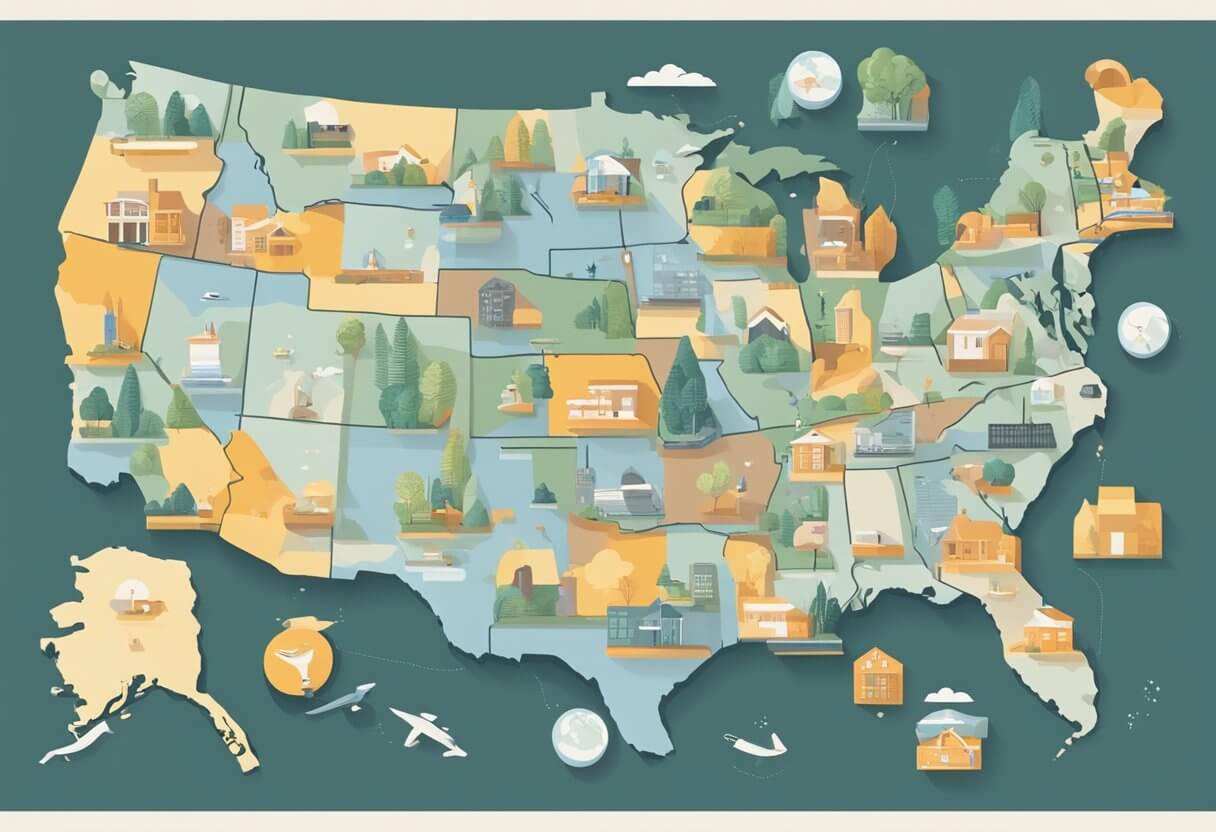Real estate professionals often seek to expand their opportunities by taking advantage of the interstate market, and New York agents are no exception. As a New York real estate agent, you might wonder if it’s feasible to hold licenses in multiple states to broaden your horizon and serve a larger clientele. The answer lies in understanding the policies governing real estate license reciprocity and portability across state lines.

Reciprocity agreements can be incredibly valuable to agents who wish to operate in different states without the need for completing the full licensing process from scratch in each new state. Navigating these agreements and their specific requirements is crucial to ensuring you can legally practice in multiple markets.
Key Takeaways
- New York real estate agents can hold licenses in multiple states, subject to specific requirements.
- Understanding reciprocity agreements is essential for New York agents looking to expand their practice.
- The process of obtaining licenses in multiple states involves navigating various state-specific requirements.
Getting Your Real Estate License

To become a licensed real estate agent in New York, you must adhere to specific requirements. These serve as the foundation for your journey into real estate.
Eligibility:
- Age: You must be at least 18 years old.
- Education: Complete 77 hours of approved education through a platform like Corofy, a fully online real estate school.
Steps to Licensure:
- Application: Submit a completed application along with the appropriate fee to the Department of State.
- Education: Enroll in and successfully pass a 77-hour pre-licensing course.
- Examination: Schedule and pass the NYS Real Estate Salesperson exam.
Once these steps are completed, you’ll need to align with a licensed New York real estate broker who will sponsor your license.
Tips for Success:
- Review the licensing requirements comprehensively before you begin.
- Dedicate time to study for the real estate exam to ensure a passing score.
- Keep track of any deadlines for your application and fee submissions.
Following these guidelines makes you equipped to embark on your career as a realtor in New York.
Understanding Real Estate Reciprocity
As a New York real estate agent, understanding reciprocity is crucial for expanding your practice across state lines. Here’s what you need to know.
What Does Real Estate Reciprocity Mean?
Real estate reciprocity refers to agreements between states allowing real estate agents licensed in one state to practice in another without completing all the usual licensing requirements. Reciprocity agreements can be full, where no additional exams or courses are needed, or partial, often requiring some additional state-specific education or examination.
What States Does A New York Real Estate License Transfer To?
As of February 1, 2023, New York does not have any reciprocity agreements with other states. A New York real estate licensee wishing to conduct business in other states must meet those states’ licensing requirements, which could include additional education courses, exams, or both.
Should You Get Your Real Estate License In Multiple States?
Deciding whether to obtain real estate licenses in multiple states depends on a variety of factors, including your business goals, the portability of your current license, and the real estate laws of the states in question. If your business is near state borders or you handle transactions in multiple states, holding additional licenses could be beneficial. However, keep in mind that each state’s licensing requirements and real estate laws will dictate the necessary steps you need to take.
State-by-State Guide to Real Estate License Reciprocity
Navigating real estate license reciprocity is essential for New York agents considering practice in other states. This guide provides clarity on which states offer reciprocal arrangements with New York.
License Portability and Reciprocity Agreements
New York has reciprocity agreements with nine states: Arkansas, Colorado, Connecticut, Georgia, Massachusetts, Mississippi, Oklahoma, Pennsylvania, and West Virginia. As a New York licensee, this means you can potentially get a real estate license in these states without taking their entire real estate examinations.
- Arkansas reciprocates with New York, but licensee candidates may need to take the Arkansas law portion of the real estate exam.
- For Colorado, if you hold a New York license, you’re eligible to apply for a Colorado license by endorsement provided you pass the Colorado portion of the licensing exam and meet the other requirements specified by the state’s regulatory body.
- In Connecticut, as a New York real estate professional, you can apply directly for a license without retaking prelicensing courses, but must pass the Connecticut state real estate exam.
- Georgia offers reciprocity to New York agents, although conditions may include passing a state law exam and fulfilling specific education requirements.
- If you’re from New York and pursuing a license in Massachusetts, you’ll need to provide proof of current licensure and may be subjected to the state’s exam.
- Mississippi allows New York agents to apply for reciprocity; however, Mississippi requires applicants to pass the state’s portion of the real estate licensing exam.
- Oklahoma has a reciprocal agreement with New York as well, entailing that New York agents meet continuing education requirements and pass the state-specific exam.
- Pennsylvania provides reciprocity with New York. New York licensees must pass the Pennsylvania state law exam and fulfill application requirements to be eligible.
- West Virginia offers reciprocity with New York but requires licensees to successfully complete the West Virginia law portion of the exam and file the appropriate applications with documentation of New York licensure.
These arrangements allow New York agents to broaden their practice across state lines, offering greater flexibility and opportunity. Always confirm with the real estate commission of the state you are interested in for the most current information and specific requirements for New York licensees. Regulations can change, and it is vital to ensure you have the latest information before proceeding with the reciprocity process.
Conclusion
In New York, you as a real estate agent may hold licenses in multiple states, opening doors to a wider scope of business and transactions. This is possible through reciprocity agreements that New York shares with other states. License reciprocity simplifies the process, allowing you to apply for a non-resident license without retaking prelicensing courses or exams.
- Reciprocity agreements vary; some require only the state-specific portion of the licensing exam.
- Application procedures must adhere to the real estate laws and state laws of both your home state and the state where you seek licensure.
Corofy, as a fully online real estate school, can be an invaluable resource in your journey to understand the intricacies of real estate licensing across 50 states. With a knowledge base that reflects the diversity of state regulations, you can navigate the application processes with confidence.
Remember, the extent of reciprocity, the ease of the application process, and the exact requirements will depend on the state. Always stay informed about the specific reciprocity rules and regulations that pertain to New York agents seeking licensure in additional states. Your diligence in understanding the legal landscape will serve as a strong foundation for your real estate practice across state lines.
Frequently Asked Questions
Navigating the intricacies of holding multiple real estate licenses can be complex. This section answers key questions that New York real estate agents commonly encounter when considering licensure in additional states.
What requirements must be met to hold real estate licenses in different states?
To hold real estate licenses in different states, you must meet each state’s unique licensing requirements, which may include additional education, passing state-specific examinations, and submitting to background checks. Knowledge of reciprocity agreements between New York and other states is also essential.
Are there specific states where a New York real estate license is particularly transferrable?
Yes, a New York real estate license is particularly transferrable to states that have reciprocity agreements with New York. Each reciprocal state has its own stipulations, and you should verify if a direct transfer is possible or if additional steps are necessary as detailed by NY State Real Estate License Reciprocity.
What is the process to obtain a real estate license in another state if you’re already licensed in New York?
The process for obtaining a real estate license in another state when you’re already licensed in New York typically involves applying for licensure in the new state, possibly taking additional coursework, and passing any necessary exams. You should review the real estate exam requirements for the state where you wish to get licensed.
How does real estate license reciprocity work between states?
Real estate license reciprocity allows agents licensed in one state to apply for a license in another state without having to take that state’s licensing exam. However, you may still need to complete other application requirements and acknowledge the jurisdiction’s legal mandates. Reciprocity varies from state to state, so researching the specific requirements for the state in question is vital.
What are the limitations on practicing real estate across state lines?
Practicing real estate across state lines is generally limited to states where you hold a valid license. Without a license in the state where the property is located, you cannot legally perform real estate activities. Each state enforces its own real estate laws, and practicing without proper licensure could lead to legal penalties.
Is it possible to represent multiple brokers across different state jurisdictions?
It is possible to represent multiple brokers across different states, but you must hold an active license in each jurisdiction and comply with all the regulatory requirements. You should ensure your compliance with the brokerage laws and agreements in each state where you plan to work.



